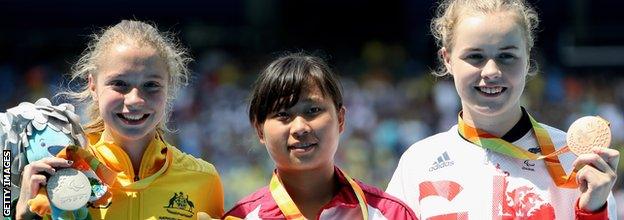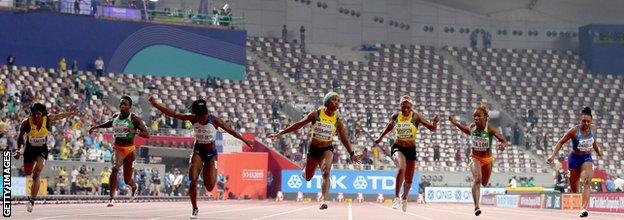World Para-Athletics: Maria Lyle on medals & mental health
- Published
Lyle 'was fed up being unhappy'
2019 World Para-Athletics Championships | |
|---|---|
Venue: Dubai Dates: 7-15 November |
At the age of 14, Maria Lyle was a sprint world record holder and double European champion.
At 15, she was a world championship silver medallist. And by 16, she had climbed on to the podium at the Rio Paralympics.
She had only ever known success since taking up running age nine, including breaking a world record at just 12, only for it not to count because she was too young to be given an official classification.
Medals rained in as the fiercely-competitive teenager from Dunbar consistently hit the heights as she went all around the globe for races.
But something wasn't right.
"I started feeling a bit rubbish about myself when I became a teenager and that just became a bigger and bigger issue as I've got older," Lyle told BBC Scotland. "If I'd maybe sought help earlier, I perhaps wouldn't have got myself into the mess I got myself into."
That "mess" came to a head last year when, after a race, she walked straight from the track, got into her mum's car and broke down. Anxiety had finally overcome her.
"I felt awful, it was a horrible feeling I'd never felt before, but it was probably a release of all the emotions I'd been having for the past 10 years."
Now recovered and ready to compete for medals at the World Para-athletics Championships in Dubai, Lyle tells BBC Scotland about her battle with anxiety, her quest for para-athletes to be heard, and rediscovering her love for racing.
'I thought nobody liked me'
Lyle, who has cerebral palsy, traces her struggles with anxiety to becoming a teenager.
For her, success on the track was not a means to bolster her confidence and a show of strength; rather it was a shield she used to escape confronting feelings of inadequacy.
"I've always struggled with that," Lyle says. "I felt judged. When I was at school I'd think 'nobody in my year likes me, I've got no friends' and I'd feel uncomfortable going to school, uncomfortable seeing people I knew at the shops.
"It's a shame because I probably didn't make the most of my school years, or making friends because I was so obsessed about what people thought of me. Sometimes it got to the point where it would actually hurt my chest, and I was quite depressed with it."

Maria Lyle, right, claimed a silver medal and two bronze at the Rio Paralympics
Increasing success did not improve her sense of self-worth and, as her mental health deteriorated, the standards she held herself to on the track started to become an increasingly heavy load to bear. In Rio she won a silver and two bronze, but racing became a loveless chore.
"I didn't run the times I wanted to run. So I said I'm not doing all the celebration stuff, I'm not going to that parade, not meeting that person because I don't deserve it. And it's a shame because I've missed out," she says.
"It's been a real life lesson - who cares if I didn't run a personal best, I won three medals. But I guess that's hard to say to someone who's so stuck in their ways."
Lyle, now 19, speaks with a wisdom well beyond her years. It's no surprise, given she has had more life experience in her teens than many will have by the age of 30.
Multiple medals from competing globally alongside school, then work at the Scottish parliament, and now studying at university - she's packed a lot in.
Breaking down in tears in her mum's car was the turning point, the moment she took control and admitted to herself and her family she needed help.
"I was just fed up of being unhappy," she recalls. "It was just about taking each thing, breaking it apart and just realising that there's more to life than running.
"My advice would be if you're feeling a bit rubbish and a bit low, just speak to anybody you trust and feel comfortable with. Seeking help isn't something to be ashamed of, it's done wonders for me."
'If it was para-athletes, nobody would care'

The women's 100m final at the World Championships took place in front of a sparse crowd
It is hard not to think the age at which Lyle - and many other para-athletes - start out on the global stage is just too young.
The pressure of delivering at the highest level to maintain funding at just 14, from the outside, seems ridiculous. Lyle, though, is more circumspect, saying "it depends on the person".
But make no mistake, she is fiercely driven by the desire to see improvements in athlete welfare and ensure para-athletes are given the same rights and respect as able-bodied ones.
At the World Championships in Doha last month, much was made of the empty stadiums in Qatar. Will there be the same volume of critics if a similar situation occurs in Dubai over the next week?
"I saw a tweet from one of my fellow athletes on the para squad. What he was saying was if it was us, nobody would have cared if nobody came to see us," says Lyle.
"It's quite normal that we won't get a crowd, but because it's an able-bodied champs it's such a big thing. Why should they get all this publicity for having no crowds when nobody cares about that for us?
"I've got people in my team who are world record-holders, they've won gold at every major championships and they've got no sponsorship deals, whereas you've got someone who perhaps hasn't even made a GB team and they've got a kit deal.
"It just makes you feel a bit less of an athlete, and a bit second-class. That might make people feel uncomfortable but it needs to be said."
'Absolutely shocking' - Denise Lewis on empty stands in Doha
'I'm actually enjoying racing again'
With such a passion for Para-sport, it's no surprise Lyle wants to go into sports administration or coaching when she finishes her career to try and make a difference.
Right now, though, her focus is running. Well, that and studying for upcoming university exams, which she'll have to fit around competing in Dubai.
Since seeking help for her anxiety, she feels as though a pressure valve has been released. She's running a second quicker than in 2018, and is the second fastest in the world over both 100 and 200m this year.
Lyle has never won individual gold at the World Championships before, so is this her time?
"A medal would be lovely but that's not what I'm focusing on," she says. "I used to really struggle with that because I was used to being number one, but as new athletes came in I got knocked down a place.
"I think it's learning 'who cares, a medal is a medal'. It doesn't make you any less of a person if you're first, second, or 15th as long as I'm feeling good, I have a good run and I'm happy with my performance.
"I actually enjoy racing whereas I used to hate it and dread it. I'm looking forward to competing which is something really different for me. But I'm happy that sense of enjoyment is back."
And that enjoyment is worth more than any medal.